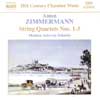Zimmermann String Quartets Op 3
This music can’t match Haydn’s originality but it’s enjoyable listening in its own right
View record and artist detailsRecord and Artist Details
Composer or Director: Anton Zimmermann
Genre:
Chamber
Label: Naxos
Magazine Review Date: 2/2004
Media Format: CD or Download
Media Runtime: 68
Mastering:
Stereo
DDD
Catalogue Number: 8 553952

Tracks:
| Composition | Artist Credit |
|---|---|
| String Quartets |
Anton Zimmermann, Composer
Anton Zimmermann, Composer Musica Aeterna Soloist |
Author: Stanley Sadie
Anton Zimmermann (1741–81) came from the Silesian area, the north-east of what is now the Czech Republic, and worked mainly in Pressburg (now Bratislava); he was quite a prolific composer of sacred, dramatic, orchestral and chamber music, but he hasn’t been much revived – I confess I haven’t heard a note of his music before, or if I have I’ve forgotten it. That isn’t meant to be a criticism. Zimmermann is a very capable, very professional composer as shown by these three quartets, which are in an idiom much like that of, say, Haydn’s Op 9 – they date, like Op 9, from the beginning of the 1770s or a little later. Each is in five movements, with a pair of minuets as second and fourth.
The actual invention, as you would imagine, is less enterprising, less original than Haydn’s, but there are a lot of pleasing ideas, with some expressive writing in the slow movements (especially the Adagio of No 1, and that of No 2 has a charming muted violin solo above pizzicati), and some witty touches in the quick ones (try the finale of No 1 or the spirited middle movement of No 2). And the trios of the minuets are often appealing. Zimmermann is a little apt to write rhythmically dullish bass parts: the cellist may, I should think, have got a little weary of playing crotchets by the end of the session.
The Musica Aeterna Soloists play firmly into the notes and give sympathetic performances, with a sure grasp of style and tempo; the first violinist perhaps finds the rapid variation in the first movement of No 3 a shade testing. Altogether an interesting disc, particularly for anyone curious about the background from which Haydn emerged.
The actual invention, as you would imagine, is less enterprising, less original than Haydn’s, but there are a lot of pleasing ideas, with some expressive writing in the slow movements (especially the Adagio of No 1, and that of No 2 has a charming muted violin solo above pizzicati), and some witty touches in the quick ones (try the finale of No 1 or the spirited middle movement of No 2). And the trios of the minuets are often appealing. Zimmermann is a little apt to write rhythmically dullish bass parts: the cellist may, I should think, have got a little weary of playing crotchets by the end of the session.
The Musica Aeterna Soloists play firmly into the notes and give sympathetic performances, with a sure grasp of style and tempo; the first violinist perhaps finds the rapid variation in the first movement of No 3 a shade testing. Altogether an interesting disc, particularly for anyone curious about the background from which Haydn emerged.
Discover the world's largest classical music catalogue with Presto Music.

Gramophone Digital Club
- Digital Edition
- Digital Archive
- Reviews Database
- Full website access
From £8.75 / month
Subscribe
Gramophone Full Club
- Print Edition
- Digital Edition
- Digital Archive
- Reviews Database
- Full website access
From £11.00 / month
Subscribe
If you are a library, university or other organisation that would be interested in an institutional subscription to Gramophone please click here for further information.




